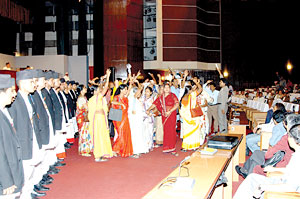 BHASWOR OJHA |
No longer can three Pahadi Bahun men sit in Baluwatar and decide for the rest of the country.
That format of decision-making had certain advantages when the peace process was at a nascent stage. But there is no alternative to more broad-based consultation, both inside the constituent assembly and outside at the district level, if this process is to move forward.
Seen from here, Kathmandu seems to have already forgotten that elections happened in this country. The result rejected old-style Kathmandu politics, but there is just more of the same. The polls were possible because the Madhesi leadership signed the eight-point agreement and calmed the radicalisation in the Tarai.
The elections themselves revealed the intensity of identity aspirations in the Tarai. Madhesis elected their own leaders and they made it clear they would kick and scream if neglected. The daily obstruction of the assembly is an early manifestation of things to come.
However, for sections of the Madhesi leadership, hatred of the Maoists overshadows the rivalry with the NC. Girija Koirala smartly used the Madhes card to tell the Maoists they still needed him to balance things out, and that he could be dangerous in opposition.
At the same time, other Madhesi leaders saw the present round of sloganeering as preparing the ground for joining the government. Upendra Yadav is quite keen to get in but knows he could be accused of selling out, both from within the party and from other Madhesi groups.
The MJF may have ratcheted up the rhetoric to portray the supplementary amendment as a partial victory which addressed their demands for now, thus paving way to join the government.
This section does not see any advantage in cosying up to their main rival, the NC, because it is a sinking ship and is conservative on federalism. Instead, a tactical relationship with the Maoists makes more sense.
And then you have the other players who have limited stakes but are keen to make their presence felt. Mahato's Sadbhabana was furious with Koirala for unfairly giving the one seat allotted to them in the 26-seat quota to Shyam Sundar Gupta, a discredited politician without a party or any following.
Junior leaders of the TMLP like Jitendra Sonal and Ram Kumar Sharma were with Upendra Yadav last year, then allied with the more radical faction of Kishore Biswas and were active during the street protests. Agitation politics has got them this far and they feel it is the way to climb higher in Kathmandu.
The assembly is meant to write a new constitution, not only to amend the interim constitution. In that sense, the demand for incorporating Madhes-related clauses means little in specific terms. But for many Madhesi leaders, this was a test case to see if their demands would be addressed within the CA framework.
Once they felt the need for such a constitutional guarantee, there was no need for the other parties to make such a big deal and drag their feet. They should have been more willing, and prompt, to give a firmer commitment to a previously signed agreement.
The Madhesi parties were not demanding a united Madhes in this amendment. But there was an orchestrated attempt by the UML, its loyalist civil society and sections of the media, to portray it that way to show Madhesi groups as unreasonable.
Samagra Madhes is a future battle, not the issue right now. The UML's move exposed it for what it is: an insular Pahadi party and true disciple of Mahendra's nationalism. Balkhu may seem important in the numbers game right now, but their expected marginalisation from Nepali politics is good news for the Madhes.
In Nepal's polarised politics, the Madhes card will tilt the game and decide the winner. It can be used in different ways. It may spring up when you least expect it. Whether it goes along with the other actors is impossible to predict. What is certain is that it cannot be discarded.



